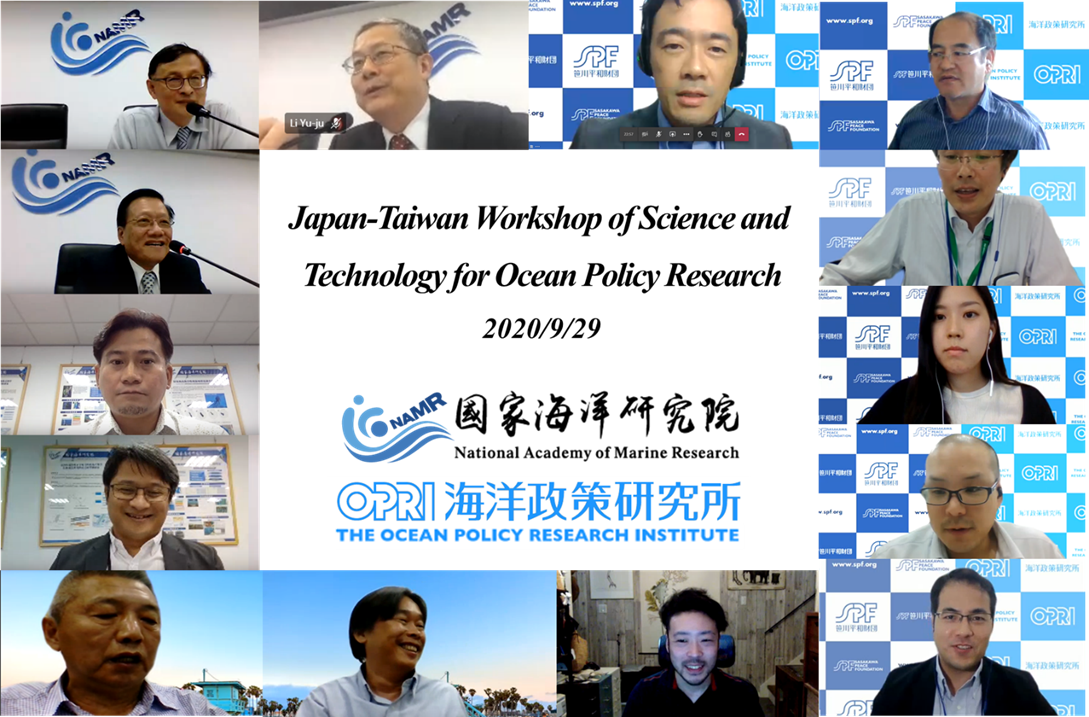News
[Event Report] Japan-Taiwan Workshop of Science and Technology for Ocean Policy Research

(left) Tomonari Akamatsu, Research Director, Ocean Policy Research Institute of SPF, (right) Yung-Fang Chiu, NAMR President.
The workshop consisted of three themes: Blue economy, Ocean visualization, and Ocean governance. 12 experts from OPRI and NAMR shared common concerns from the perspectives of Taiwan and Japan on the following topics:
I. Blue Economy
- Co-chairs: Atsushi Watanabe, Senior Research Fellow (OPRI)
Chien-Hung Chen, Vice President (NAMR)
- Ocean plastic debris management
“A Widespread plastic litter distribution survey considering population coverage connecting global corporate countermeasures formed on cloud GIS” by Tomo Shioiri, Senior Officer (Ocean Division, The Nippon Foundation)
“The rapid method for microplastic detection using image processing” by Wen-Jong Yang, Assistant Research Fellow (NAMR) - Deep seawater and renewable energy
“A sustainable blue economy – co-benefits and stakeholder partnership for OTEC and offshore wind power generation” by Masanori Kobayashi, Senior Research Fellow (OPRI)
“The status and perspectives of deep sea water research in Taiwan” by Tsai-Lun Yu, Assistant Research Fellow (NAMR)
II. Ocean Visualization
- Co-chairs: Tomonari Akamatsu, Principal Research Fellow, Research Director (OPRI)
Hung-Yang Yen, Distinguished Chair Professor, National Museum of Marine Biology and Aquarium (Taiwan)
- Ocean visualization platform
“Present and future platforms for ocean monitoring” by Tomonari Akamatsu, Principal Research Fellow, Research Director (OPRI)
“Ocean environmental information: From data to knowledge” by Wen-Chang Yang, Research Fellow and Acting Director (NAMR) - Ocean visualization case study
“Visualisation of ocean by Bio-logging” by Takashi Iwata, Research Fellow (OPRI)
“Impact of marine invasive fishes on native ecosystem” by Chih-Wei Chang, Research Fellow, Acting Director (NAMR)
III. Ocean Governance
- Co-chairs: Michael C. Huang, Research Fellow (OPRI)
Author Yei-Fei Lee, Chief Secretary (NAMR)
- Climate change adaptation and marine spatial planning
“Understanding and measuring climate and ocean risk in Asia Pacific coastal cities” by Nagisa Yoshioka, Research Associate (OPRI)
“Development and challenge of legal system for marine spatial planning in Taiwan” by Yu-Cheng Wang, Research Fellow and Acting Director (NAMR) - Disaster risk assessment and marine leisure management
“Tsunami disaster impact and vulnerability index assessment: An approach of GIS and CGE model” by Hajime Tanaka, Research Fellow (OPRI)
“Safety issues and technology assistance before we encourage the public’s embrace of the ocean” by Chie-Wu Lai, Research Fellow (NAMR)

“It is more like a class reunion rather than a workshop,” said Co-chair, Dr. Hong-Yang Yen, Distinguished Professor of the National Museum of Marine Biology and Aquarium, who has worked in this field for decades. Dr. Yung-Fang Chiu, President of NAMR, stated in his concluding remarks that the workshop serves as a platform to demonstrate research outcomes, allowing researchers from both institutes to better understand each other through new ideas. Director Akamatsu praised the success of the workshop and emphasized that the academic collaboration should be deepened and sustained.